One of the most common pieces of advice that personal finance experts offer consumers is to pay their credit card bills in full every month, to avoid paying high interest rates on outstanding balances. Consumers are counseled to avoid getting into the habit of using credit cards and instead pay cash whenever possible. Some advisers go so far as to recommend freezing the cards in a block of ice to avoid impulse purchases.
Despite these words of wisdom, the average American, according to aggregated Gallup Poll data from 2002 to 2004*, has about four credit cards. That number increases by age category through Americans' working years, but those aged 65 and older hold fewer cards on average than those between the ages of 30 and 64.
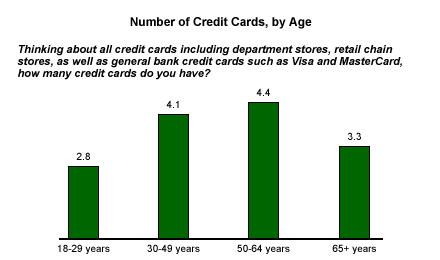
Perhaps a sign that wisdom increases with age, the proportion of credit card owners who pay their credit cards in full every month is highest among cardholders over the age of 50 (42% among 50- to 64-year-olds, 66% among those 65 and older). Interestingly, cardholders in their 30s and 40s are no better than the youngest adults (aged 18 to 29) when it comes to paying their cards in full each month (29% of people in the former group pay their credit card bills off every month, compared with 31% of those in the latter group).
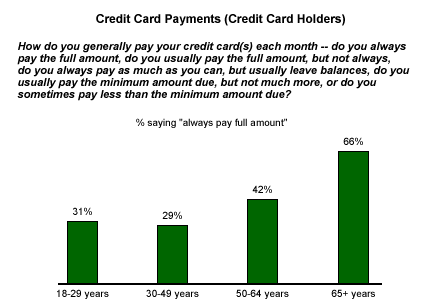
These age-group differences can't be explained away solely on the basis of income. Cardholders between the ages of 30 and 49 have significantly higher household incomes (36% earn $75,000 or more) than those between the ages of 18 and 29 (15% earn $75,000 or more) and those aged 65 and older (11% earn $75,000 or more). Yet 30- to 49-year-olds are significantly less likely to pay off their cards than those over 65, and they are about equally as likely as 18- to 29-year-olds to pay them off. On average, cardholders between the ages of 30 and 49 have similar incomes to those of 50- to 64-year-old cardholders, yet 50- to 64-year-olds are much more likely to pay off their cards every month.
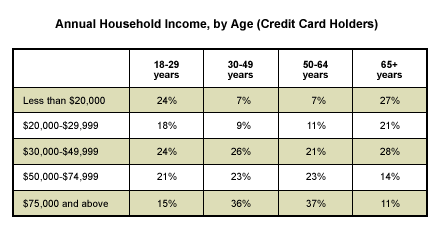
However, cardholders between the ages of 30 and 49 are more likely than those in any other age group to have children under the age of 18 (65%), followed by 18- to 29-year-old cardholders (29%). Only 16% of 50- to 64-year-olds have children under 18, as do just 5% of those aged 65+. Child-related expenses may help explain why so many younger people do not pay credit cards in full each month. In fact, in general, credit card owners with children under the age of 18 are less likely than those without children under 18 to say they pay their cards off each month. Young parents can take heart that the largely empty-nested 50+ population is better able to pay credit cards off each month.
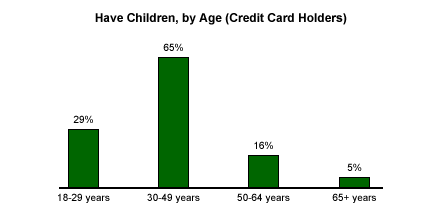
Bottom Line
In its April 2004 Economy and Personal Finance poll**, Gallup asked Americans whether they currently have enough money to live comfortably. Across the board, the percentage saying yes increases with age.
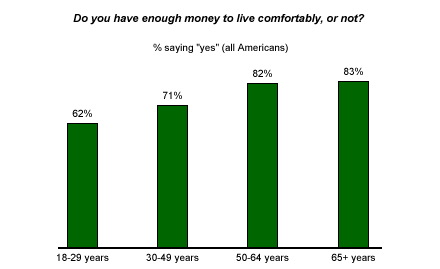
So regardless of expenses, it appears that 30- to 49-year-old Americans are better off financially on average than 18- to 29-year-olds. Yet 30- to 49-year-olds are no better at paying off their credit cards each month. When it comes to charging more than they can pay off each month, it seems that 30- to 49-year-olds may be old enough to know better, but young enough to do it anyway.
*Results are based on telephone interviews with 1,681 national adults with credit cards, aged 18 and older, conducted in April 2002 and April 2004. For results based on interviews with 199 18- to 29-year-olds, one can say with 95% confidence that the margin of error is ±7 percentage points. For results based on interviews with 691 30- to 49-year-olds, one can say with 95% confidence that the margin of error is ±4 percentage points. For results based on interviews with 461 50- to 64-year-olds, one can say with 95% confidence that the margin of error is ±5 percentage points. For results based on interviews with 310 adults 65 and older, one can say with 95% confidence that the margin of error is ±6 percentage points.
**Results are based on telephone interviews with 1,005 national adults, aged 18 and older, conducted in April 2004. For results based on interviews with 119 18- to 29-year-olds, one can say with 95% confidence that the margin of error is ±9 percentage points. For results based on interviews with 368 30- to 49-year-olds, one can say with 95% confidence that the margin of error is ±5 percentage points. For results based on interviews with 283 50- to 64-year-olds or 235 adults 65 and older, one can say with 95% confidence that the margin of error is ±6 percentage points.

